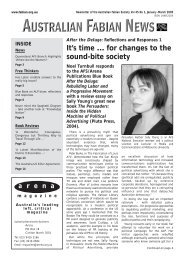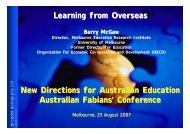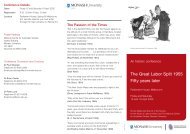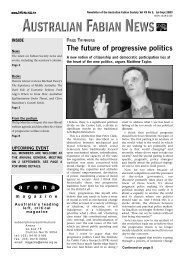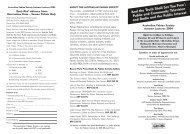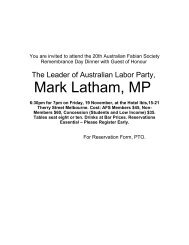AFN vol 44 No 4 Oct-Dec04 - Australian Fabian Society
AFN vol 44 No 4 Oct-Dec04 - Australian Fabian Society
AFN vol 44 No 4 Oct-Dec04 - Australian Fabian Society
Create successful ePaper yourself
Turn your PDF publications into a flip-book with our unique Google optimized e-Paper software.
PAGE 8<br />
Opportunities lost<br />
FREE THINKERS<br />
Australia is still hopelessly monolinguistic, and it’s holding<br />
our development back, argues Greg Barns.<br />
<strong>Australian</strong> <strong>Fabian</strong> News<br />
<strong>Oct</strong>ober–December 2004<br />
Talented <strong>Australian</strong>s expand their<br />
horizons by studying in the US and<br />
the UK. They adore working in cities<br />
like New York and London, and<br />
upgrade their skills in public and<br />
private sector organisations across the<br />
Anglophone world.<br />
But what if it were unexceptional for<br />
<strong>Australian</strong>s to study in Hanover or<br />
Helsinki, routinely fast-track their<br />
careers in Budapest and Buenos Aires,<br />
and participate in peer-to-peer<br />
exchanges with institutions in Seoul<br />
and Stockholm? This cannot happen<br />
unless <strong>Australian</strong>s start looking and<br />
learning beyond the English language.<br />
There is only so far you can go in terms<br />
of understanding potential friends, and<br />
enemies, without mastering their native<br />
language and its nuances.<br />
Most of us agree that all <strong>Australian</strong>s<br />
should speak fluent English, and that<br />
this aim is a core component of working<br />
multiculturalism. Yet we almost<br />
completely ignore another more than<br />
200 languages spoken in this country,<br />
and <strong>Australian</strong>s come from more than<br />
200 birthplaces. Despite the unusual<br />
depth and breadth of these linguistic<br />
resources at our disposal, Australia’s<br />
cultural, educational, political and<br />
business experiences are primarily<br />
conducted through the medium of the<br />
English language. According to the<br />
<strong>Australian</strong> Bureau of Statistics, only<br />
around 15 per cent of the <strong>Australian</strong><br />
population speaks a language other<br />
than English at home. Worse, there are<br />
no signs of up and coming generational<br />
change. In Victoria, for example, only<br />
8 percent of Year 12 students study a<br />
language other than English.<br />
Other Western nations don’t share<br />
our blind, dumb spot. Half the<br />
population of Europe is bilingual. In the<br />
US, 11 per cent of the population speaks<br />
Spanish – including George W. Bush, a<br />
man who proudly boasted he had never<br />
been to Europe until he became<br />
President in 2000. British Prime<br />
Minister Tony Blair famously and<br />
fluently addresses French President<br />
Jacques Chirac and the French<br />
Parliament in their own language.<br />
The opportunities offered by our<br />
e<strong>vol</strong>ving racial demographics were<br />
something that Gough Whitlam and<br />
Malcolm Fraser recognised in their<br />
pursuit of multicultural policies that<br />
were more than skin deep. Their open,<br />
pluralistic approach to these matters<br />
culminated in the introduction of Paul<br />
Keating’s Asian Languages program for<br />
schools in 1995. Keating recognised that<br />
speaking the languages – and thereby<br />
accessing the culture – of Asia was vital<br />
to Australia becoming a genuinely long<br />
term member of the region in which we<br />
live.<br />
John Howard cancelled that program<br />
in 1999. Was this part of Howard’s<br />
strategic backlash against ‘political<br />
correctness’ and Keating’s ‘vision<br />
thing’? Or was it because multilingualism<br />
threatens the vision of ‘one<br />
nation’, where language is used to<br />
enforce ‘belonging’ in its narrowest<br />
sense? Current Howard Government<br />
spending on teaching young<br />
<strong>Australian</strong>s languages other than<br />
English is woefully inadequate. It<br />
announced in the 2003 Federal Budget<br />
a minute total of $104 million for<br />
languages education, out of a total<br />
education budget worth $16 billion.<br />
It’s not just our politicians who seem<br />
to care little about the opportunities lost<br />
to <strong>Australian</strong>s through incompetence in<br />
other languages. The Business Council<br />
of Australia, an influential group<br />
representing the ‘big end of town’ and<br />
spending millions of dollars on research<br />
and advocacy each year, failed to<br />
include language issues in its otherwise<br />
admirable 2002 ‘Future Directions’<br />
project. Yet as Tony Liddicoat, president<br />
of the <strong>Australian</strong> Federation of Modern<br />
Language Teachers Associations told<br />
The Age on <strong>Oct</strong>ober 20 last year: “You<br />
do need English plus another language<br />
to be really competitive in a whole lot<br />
of jobs’.”<br />
www.fabian.org.au<br />
Let’s stop denying the reality and the<br />
possibility of what Australia could and<br />
should be in the 21st century. Let’s do it<br />
not just to make more money,<br />
understand art films or enhance the<br />
intelligence of our spying and<br />
surveillance. Let’s do it to combat the<br />
innate conservatism that’s allowed fear<br />
politics to get such a tight grip on us in<br />
recent years, and which prevents our<br />
democracy maturing to embrace<br />
overdue constitutional reforms such as a<br />
republic. For the capacity to understand<br />
other cultures, values and perspectives<br />
will bring a greater preparedness to<br />
reform our own society – imaginatively,<br />
and in ways that will really work for<br />
Australia.<br />
Greg Barns is a Hobart based writer<br />
and lawyer. This is an edited version<br />
of an article that first appeared on<br />
25 August 2004 in the new weekly<br />
online magazine, NewMatilda.com,<br />
which promotes independent political<br />
analysis and public policy development.<br />
<strong>Fabian</strong> members can subscribe online<br />
at a 20 per cent discount by quoting<br />
the promotional code ‘<strong>Fabian</strong>’ at<br />
http://www.newmatilda.com



